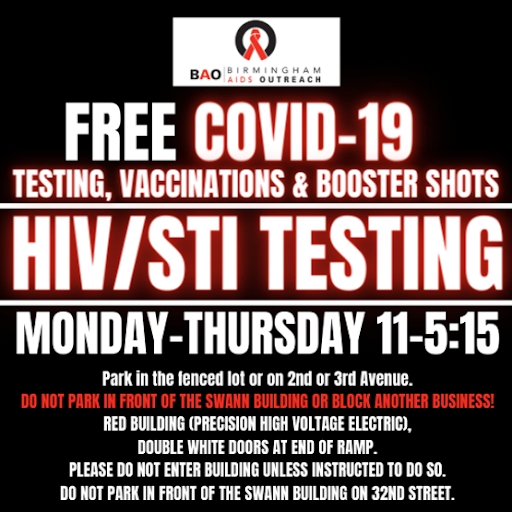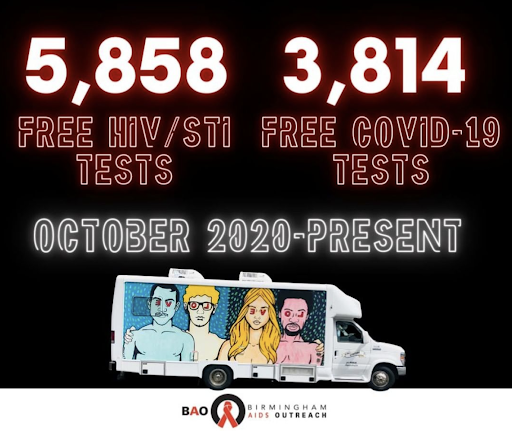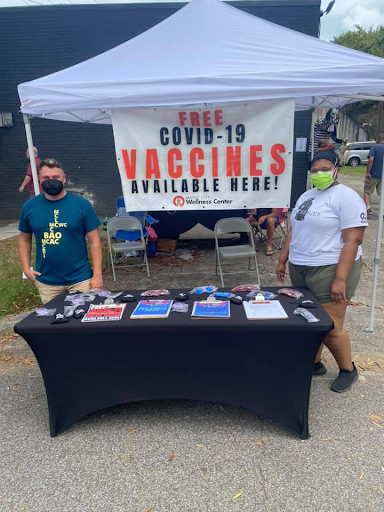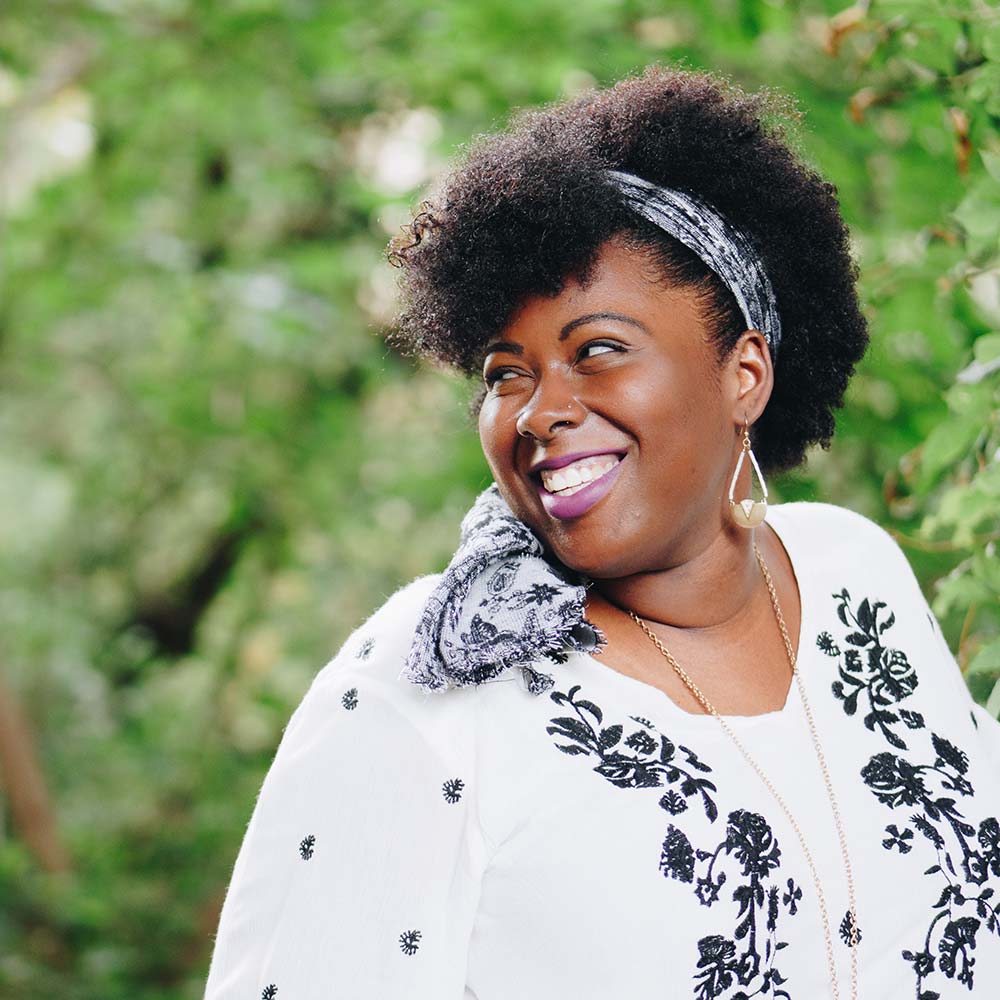From AIDS to COVID-19: How Birmingham AIDS Outreach Drew on Lessons from Past Crises to Build Towards a Brighter Future
When Birmingham AIDS Outreach (BAO) was founded our country was in the midst of a very different global health crisis. Since the outbreak of HIV/AIDS in 1981, more than 700,000 people in the U.S. have died from HIV and, to date, roughly 1.1 million Americans are currently living with HIV. Over the past 30 years new treatment and prevention measures have helped decrease the number of diagnoses and increase the lifespan of those living with HIV. But the trauma inflicted on the LGBTQ community–and particularly on people of color within this community–cannot be undone.
The medical biases and structural racism within our healthcare system have left the LGBTQ community and communities of color particularly vulnerable, once again, during the COVID-19 health crisis. For the past year, in partnership with Made to Save, BAO has devoted its time and resources to addressing these gaps within our healthcare system, supporting these communities throughout the pandemic with grassroots education and vaccine outreach efforts.
At the height of the AIDS epidemic in 1985, BAO was established as a grassroots response to the devastating and fatal impact HIV/AIDS was having on the Birmingham community. As Alabama’s first AIDS Service Organization, BAO’s mission is to enhance the quality of life for people living with HIV/AIDS, at-risk individuals, and the LGBTQ community through outreach, age-appropriate prevention education, and supportive services. Today BAO provides free services to over 800 HIV-positive individuals and has spawned many LGBTQ-focused initiatives, such as the Magic City Wellness Center. Notably, as the needs of their community have changed, BAO has also adapted its focus and reach:
“When we were incorporated in 1985, we started as a social services [organization] for people who are living with HIV. But in 2015 we changed our mission statement to include the LGBTQ community. So we were an HIV service organization that has now turned into a queer community group, and we’re also serving the entire state [of Alabama], rather than just Birmingham,” said Josh Bruce, Director of New Initiatives at Birmingham AIDS Outreach.
When the World Health Organization first declared coronavirus a global pandemic in March of 2020, BAO, like many community groups, had to quickly adapt their outreach to safely address this new health crisis, while continuing to provide their HIV services.
“We’re very proud to say that we never shut down, we never stopped services for our clients. We transitioned all of our HIV testing to drive-through testing, and then all of our other services, such as medication co-pays, legal services, and case management, into a drive-through system as well,” said Bruce.
To help their community with COVID-19 specific outreach, BAO partnered with a food bank, churches, housing authorities, and Alabama companies that were offering the vaccine to underserved populations. BAO already had access to two mobile medical clinics prior to the pandemic, which they incorporated in their COVID-19 response:
“We’re able to go into these communities and offer the vaccine, COVID testing, and COVID education. Alongside HIV testing, STI testing, hepatitis C, and also flu shots. We’ve found that bundling everything together works really well [when doing our COVID outreach]. It almost de-stigmatizes everything because it’s like, ‘Hey, you’re here for a COVID test, and while you’re here for a COVID test, why don’t you just get a full panel and get tested for everything?’” said Bruce.
Flyers Displaying the Time, Date, and Location of the Mobile Clinic (see right) that BAO Uses to Bring their Health Services into the Communities they Serve | Source: Birmingham AIDS Outreach
In Alabama, many of the underserved and under-resourced communities that BAO focuses on are communities of color. While HIV is prevalent among all populations, African Americans are the most heavily affected group, followed by Latinos. This is due to the same socioeconomic factors that have compounded health inequities during the pandemic. By region, the HIV rate (number of diagnoses per 100,000 people) is highest in the South (18.5 per 100,000 people). So when COVID-19 infections started to overwhelm the Alabama healthcare system in 2020, the data quickly revealed that the virus was disproportionately infecting and killing Black Alabamians.
Trying to reach these already vulnerable communities has been quite a challenge for BAO, particularly given that misinformation and mistrust of the COVID-19 vaccine have been rampant in Alabama. To combat these many barriers the vaccine team at BAO have had to get creative with how they conduct their COVID outreach:
“Aside from our mobile clinics, we do pop-ups at community events, churches, and schools. We’ve also set up on the street or really anywhere that anybody will take us. During the Omicron surge, when our COVID testing sites were slammed, we were able to get a lot of people vaccinated then too. While they were standing in these long lines [to get tested], our vaccine team would talk to people and do some vaccine education. We also offered to let those who were not vaccinated and wanted to get the vaccine, skip the line [as an added incentive],” said Bruce.
Magic City Wellness Center Volunteers Offer Free COVID-19 Vaccines and Other Educational Resources at a Pop-Up Community Health Event | Source: Birmingham AIDS Outreach
In doing this work, BAO has found that adaptive and innovative thinking makes all the difference. But, above all, being proactive in their outreach and building trust amongst the communities they serve are two core values that BAO has always held. Similarly, over the course of the past year, as Made to Save has worked to build relationships and trust within the communities we serve, we’ve worked to adapt our outreach tactics and pivot to meet each moment of the pandemic. As the COVID-19 pandemic eventually becomes endemic, BAO is committed to continuing its health outreach work to ensure the LGBTQ community and others impacted by these dueling health crises get the tools and access they need to these life-saving resources.
You can read more about BAO at www.birminghamaidsoutreach.org, and you can learn more about other community groups doing COVID-19 outreach work in the LGBTQ community by watching our recent panel here:



